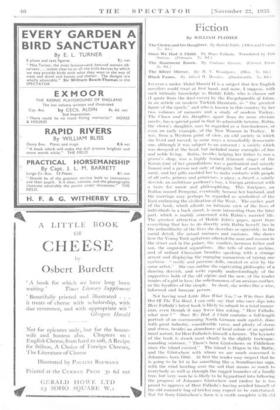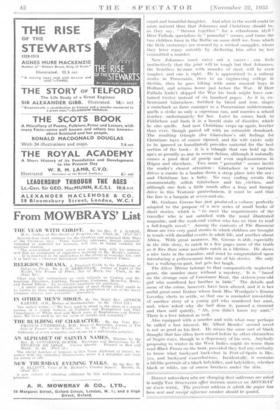Fiction
By WILLIAM PLOMER Once We Had A Child. By Hans Fallada. Translated by Eric Sutton. (Putnam. 7s. (hi. ) Isrr.i.Nnus, under Abdul Hamill II is a subject that few English
novelists could treat at first hand, and none, I suppose, with such intimate knowledge as Halide Edib, who is chosen otit
(I quote from the dust-cover), by the Encyclopaedia q/ Islam, in an article on modern Turkish literature, as " the greatest figure of the epoch," and who is known in this country by her two volunses of memoirs and a study of modern Turkey. The Clown and his Danghter, apart from its snore obvious merits, has a special point in that its admirable, heroine, Rabia, the elown's daughter. may be regarded as a foreshadower, or even an early example, of the New Woman in Turkey.. It was, from a 'Western point of view, an odd society in which she lived and moved, in sonic ways a remarkably democratic one, although it was subject to an autocrat ; a society which was decayed at the head, but included many examples of line and noble liVing. Bahia, besides helping her father to run a grocer's shop, was a highly trained itinerant singer of the Koran (one of her, grandfathers was a puritanical and miserly Imam) and a person not only Of integrity but of much refine- ment. and her gifts enabled her to make contacts with peOplo of all sorts, princes and princesses, a gipsy, a dwarf, a saintly
dervish, an ambitious gardener's boy, a foreign aristocrat With a taste for music and philosophising. This foreigner,. an Italian sunned Peregrini, eventually became her husband;,and
the marriage may perhaps be regarded as symbolical of:the East embracing the civilisation of the West. The earlier part of the book, which affords an intimate view' of the lives Of individuals in it back street, is more interest ing than f lie later 'part, which is mainly concerned With Thibia's married life. The greatest attraction of Halide Edib's pages, apart from everything that has to do directly with Rabin lierself, lies itt the usfumilinrity,of the lives she describes so agreeably, in the social detail, the actual manners and customs. She shows how the Young Turk agitations affected the man and woman inn the street and in the palace, the conflicts between father and son, the anguished, separations. -She tells of street urchins., and of radiant Circassian beauties speaking with a strange accent and displaying the engaging mannerism of raising one
eyebrow -" costly and precious dolls, created en serie by the same artist." She can outline the captivating philosophy of a dancing dervish, and write equally understandingly of the • supporters both of the old regime and the new, of the tender ironies of a girl in love, the solicitousness tua anxious mother,
or the loyalties of the simple. In short, she writes like a wise, informed and humane person.
Not having read Little Man What Now ? or Who Once Eats Out Of The Tin Bowl, I can only say that who once dips into Herr Fallsidds latest book is likely to submit to a total iinnicr- sion, even though it may leave him asking, Herr Fallada, what now " Once Ire Had A Child contains a full-length portrait of an overiveening North German male egotist, dorm with great industry, considerable verve, and plenty of storm and stress, besides an abundimee of local colour of an agricul- tural nature, for Herr Fallada is himself a farmer. The keynote of the book is struck most clearly in the slightly burlesque- sounding sentence, " There's been Giintsehows on Fiddielsow since the island existed." The island is Ragen in the Baltic, and the Giintsehow with whom we are much concerned is Johannes, born '1:898. At first the reader may suspect that lie is going to be let in 'for sothething like a Scandinavian saga, with the wind howling over 'the soil that means so much to everybody as well as through the rugged branches of a family tree, but' very soon he is likely to be hypnotised into following the progress of Johannes Giintschow and (unless he is too proud to approve of Herr Fallada's having availed himself: of theold. romantic bag of tricks) may expect to ,be enterlaincd. Not fai, from Giintschow's farm is a castle complete with old
count and beautiful daughter. And what in the world could be More natural than that Johannes and Christiane should be, as they say, " thrown together " for a schoolroom idyll ?
Herr Fallada specialises in " powerful " scenes, and turns the two children_ loose in the Baltic on some drift ice, from which the little castaways are rescued br a wicked smuggler, whom they later repay suitably by sheltering him after he has committed a murder.
Now JohanneS Must carve out a career : one feels instinctively that the joint will be tough but that Johannes, the heartless he-man with muscles of steel, will be even-
tougher, and one is right... He is apprenticed to a railway works in Pomerania, then to an engineering college in Stettin, then he goes hiking with some musical boys in Holland, and returns home just before the War. If Herr Fallada hadn't skipped the War his book might have con- tained twelve instead of six hundred pages. As it is, ex- lieutenant Glintschow, fortified by blood and iron, stages a comeback as farm manager to a Pomeranian noblewOman, quells a strike as only a superthan can, and marries a school teacher—unfortunately for her. Later he comes back to Fiddichow and finds it in a horrid state of disorder, which he also quells. And now Christiane crops up again, lovelier than ever, though paired off with an estimable drunkard. The resulting triangle (for Giintschow's old feeling's for Christiane have of course ripened, and his wife. exists only to be ignored or humiliated) provides material for the best -- section of the book : it is a triangle that can hold up its apex as proudly as any in recent fiction, although it naturally causes a good deal of gOssip and even unpleasantness in Rfigen and elsewhere. Two more " powerful " scenes invite the reader's closest attention : Glintschow in •' a tantruth drives a curate in a landau down a steep place into the sea';
and Christiane has a baby. No cosy ending awaits the monumentally selfish Glintsehow and his ,victims, and although one feels a little numb after a long. and bumpy drive in this Teutonic pantechnicon, it Must be said that the fare is a bargain at seven-and-siX.
Mr. Graham Greene has just produced a volume perfeatly adapted to the purpose of a new series of small books of short stories, which is " to meet the requirements of the traveller who is not satisfied with the usual illustrated magazine, and the week-end visitor who has no time to read a full-length novel." Among the contents of The Basement. Room are two very goOd stories in Which children are brought in touch with dreadful events in adult life, and another about Africa. With great neatness, Mr. Greene is able, especially in the title story, to catch in a few pages more of the truth as it flies than some novelists catch in a lifetime. He showS
a nice taste in the macabre, and must be congratulated upon introducing a policewoman into one of his stories: Sbe only has a walking-on-part, but gets her laugh.
The Silver Mirror belongs to that comparatively neglected genre, the murder 'story without a mystery. It is " based on the strange case of Constance Kent, the sixteen-year-old girl who murdered her brother in 1860." The details and scene of the crime, however, have been altered; and it is her awful great-aunt Esther whose hash Miss Woodgate's EmMa Loveday elects to settle, so that one is reminded irresistibly of another story of a young girl who murdered her aunt, and, when 'asked why she had done it, paused a moment and then said quietly, " Ali, you didn't know my aunt." There is a love interest as well.
Also equipped With a murder and with what may perhaps be called a lust interest, Mr. Alfred Mendes' second novel
is not so good -as his first.. - He Mixes the same sort of black draught that has often been mixed before by other chroniclers of Negro ways, though in a dispensary of his own. Anybody proposing to winter in the West Indies might do worse than read Black Fauns'on the boat, provided they feel any curiosity to knew what backyard back-chat in Port-of-Spain is like, yes, and backyard exacerbations. Incidentally, it contains a lifelike portrait of a black ladykiller, and ladykillers, whether black or white, are of course brothers under the skin.































































































 Previous page
Previous page